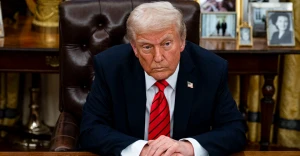
Russia blows up Kakhovka HPP: Nizhniodniprovskyi National Park with world-class lands flooded, hundreds of fish, bird species threatened
On June 6, the Russians blew up the dam of the Kakhovka hydroelectric power plant, flooding the Nizhniodniprovskyi National Park and endangering hundreds of fish and bird species
Ukraine's Ministry of Environmental Protection and Natural Resources reported this.
The flood affected areas where typical and rare communities of floodplain forests, swamps, meadows, sandy steppes, steppe slopes of the Dnipro River and gullies, and rock outcrops have been preserved.
“The high water has affected the lands of the Emerald Network and Ramsar sites, which are of global importance due to their unique biodiversity. The flora and fauna of the Nizhniodniprovskyi National Park includes 120 valuable protected species. As a result of the Russian terror, animals are dying in the territory of the National Park, and their habitats and breeding grounds are disappearing,” Ruslan Strilets, Ukraine's Minister of Environmental Protection and Natural Resources, said.
One of the main migratory routes of birds passes through the territory of Nizhniodniprovskyi National Park. Stopping places are very important for feeding and resting of migrating birds. The park has identified 60 species of birds that are subject to protection.
In addition, in the temporarily occupied Velykyi Luh National Park, due to a decrease in water levels, there is a risk of shallowing of the wetlands of the Velyki Kuchuhury and Mali Kuchuhury Archipelago.
“Due to changes in the ecosystem, 54 species of fish and 156 species of birds living on the islands of the archipelago will be under threat. As of today (June 7, - ed.), 1.7 meters of shallowing has been recorded. The critical indicator is 8 meters,” the agency writes.
The Seven Lighthouses Bay archipelago in the Velykyi Luh Park will become shallow by about 50% with a 9-meter drop in water level, while the full shallowing will be at 14 meters. 47 species of fish will disappear, and 137 species are at risk.
Explosion of the Kakhovka hydroelectric power station
On June 6, occupying Russian forces blew up the Kakhovka hydroelectric power plant, completely destroying it. The evacuation of residents of the flooded areas began. After that, President of Ukraine Volodymyr Zelenskyy convened an emergency meeting of the Security and Defense Council, and the world began to respond to the tragedy. Follow the detailed course of events here.
In particular, Ukraine's Cabinet of Ministers has allocated UAH 1.5 billion to build two new water mains that will help supply Kryvyi Rih, Nikopol and Marhanets with drinking water. In addition, the Kherson, Mykolaiv, Zaporizhzhia and Dnipro regions were allocated almost UAH 846 million to meet the regions' drinking water needs.
And a number of Ukrainian cities have declared their readiness to accept southerners.
Instead, Lieutenant General Serhiy Nayev, commander of the AFU Joint Forces, said that the occupiers' blowing up of the Kakhovka hydroelectric power plant would not affect the Ukrainian counteroffensive. And the Kyiv HPP is covered from air strikes and protected from enemy subversive reconnaissance groups.
For his part, Ukrhydroenergo CEO Ihor Syrota said that the peak of the water spill from the Kakhovka reservoir is expected in the morning of June 7. According to him, after that the situation will begin to stabilize, and in 4-5 days the water will start to subside.
And the President of Ukraine held a meeting of the supreme military command to discuss the situation at the front, readiness for a counteroffensive, and the Russian explosion of the Kakhovka hydroelectric power plant. He emphasized that Russia had mined the dam of the hydroelectric power plant last year, and Ukraine was ready for the explosion.
In addition, Volodymyr Zelenskyy discussed the consequences of the hydroelectric power plant explosion and the risks to the Zaporizhzhia nuclear power plant with the IAEA Director General and invited him to Ukraine.
The Ministry of Agrarian Policy has estimated that about 10,000 hectares of agricultural land on the right bank will be flooded as a result of the destruction of the Kakhovka HPP.
On the evening of June 6, the UN Security Council met to discuss the situation that arose after Russian troops blew up the Kakhovka hydroelectric power station dam. Ukraine's permanent representative to the UN, Sergiy Kyslytsya, said that by blowing up the hydroelectric power plant, the Russians had proved that they were unable to hold the temporarily occupied territories. In turn, the UN Under-Secretary-General emphasized that the explosion of the hydroelectric power plant would have far-reaching consequences for many thousands of people.
US President Joe Biden also responded to the tragedy. He assured of his support and assistance to Ukraine.
As a result of the explosion of the Kakhovka hydroelectric power plant, Ukraine's only state-owned sturgeon farm was flooded. This could lead to the extinction of this fish species in the country's water bodies.
Turkish President Recep Erdogan believes that Ukraine should investigate the June 6 explosion of the Kakhovka hydroelectric power plant together with the Russians.
The Ministry of Health suggests the possibility of a cholera outbreak as a result of the Russians' blowing up the Kakhovka hydroelectric dam and flooding a number of settlements.
Kakhovka dam explosion: 1700 residents of Kherson region are evacuated, Russia launches hacker attack on hotline software
As a result of the explosion of the Kakhovka hydroelectric power station, wheat prices rose by 3% to USD 6.4 per bushel, corn by 1%, and oats by 0.8%. After correction, wheat costs about USD 6.23.
The European Union will send aid to Ukraine to overcome the consequences of the Kakhovka hydroelectric power plant explosion, including filters, pumps, generators and shelter equipment.
In the occupied town of Oleshky, Kherson region, the first deaths have already occurred as a result of flooding after the Russian troops blew up the Kakhovka hydroelectric power plant, the mayor of the occupied town, Yevhen Ryshchuk, told Espreso.
- News












































